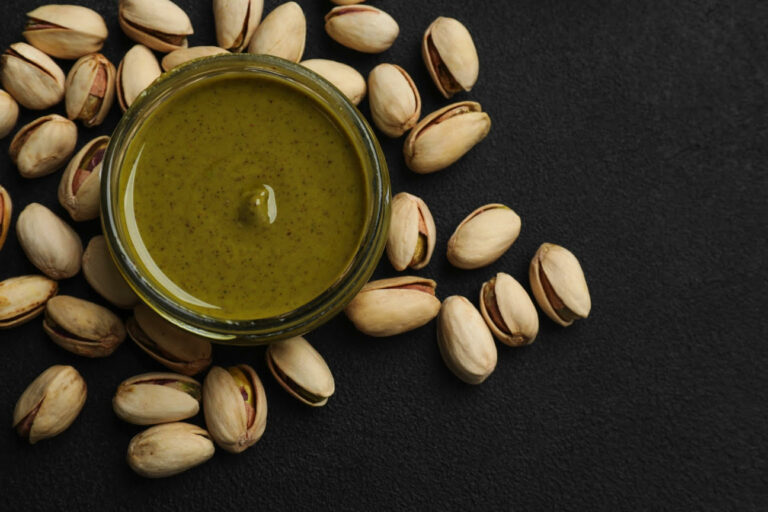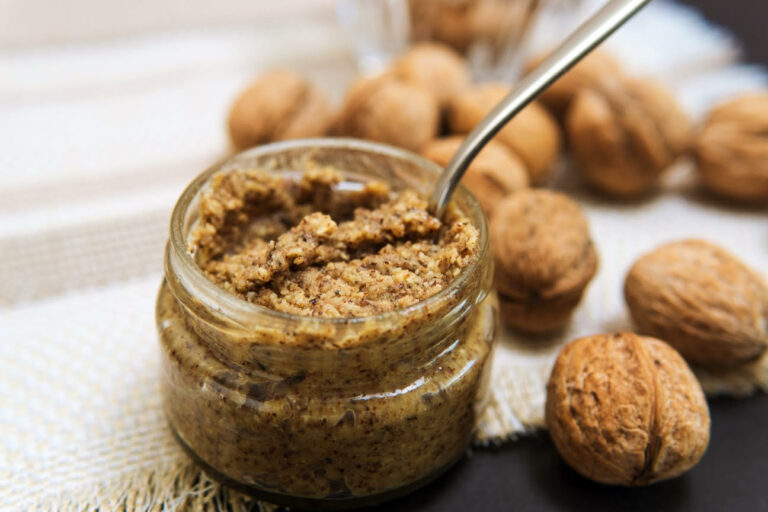
In the culinary world, dark-skinned foods (a.k.a. dark-colored foods, naturally black foods, or simply “black foods” ) stand out, not just for their captivating colors but for the myriad of health benefits they offer. These dark foods (not to be confused with goth foods), range from deep purple eggplants to midnight black beans and are nutritional gems.
Deep-hued, inherently purplish, dark brown and black foods are packed with an impressive array of nutrients. Their crepuscular shades aren’t just for show; they are indicative of the high levels of antioxidants, vitamins, and minerals contained within. The natural dark pigments (i.e. anthocyanins), help combat free radicals in the body, reducing the risk of chronic diseases and promoting overall health. Moreover, the darker the hue, the higher the concentration of these beneficial compounds, making these foods a vital component of a balanced diet.
The Antioxidant Advantage
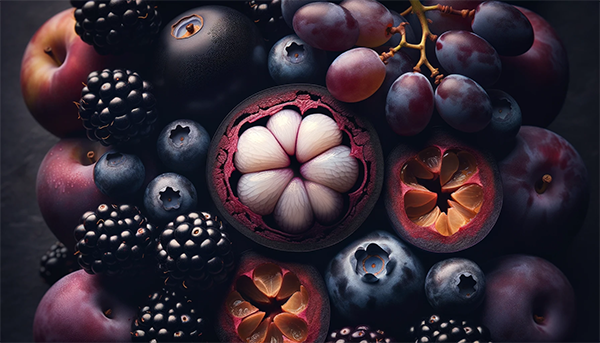
Key Foods: blackberries, blueberries, mangosteen, dark grapes, plums and black beans
Benefits: Anthocyanins, compounds responsible for the rich colors in these foods, act as potent antioxidants. They neutralize free radicals, reducing cellular damage and potentially preventing chronic diseases.
Free radicals are molecules that can damage cells and contribute to aging and diseases. The human body produces them as a natural byproduct of various metabolic processes. However, the consumption of dark-skinned foods can counteract these effects, providing protective antioxidant properties. Regularly including blackberries, blueberries and other dark-skinned foods in your diet can offer a defense mechanism against oxidative stress, which plays a pivotal role in several diseases such as cardiovascular diseases and certain cancers.
A Heart’s Best Friend
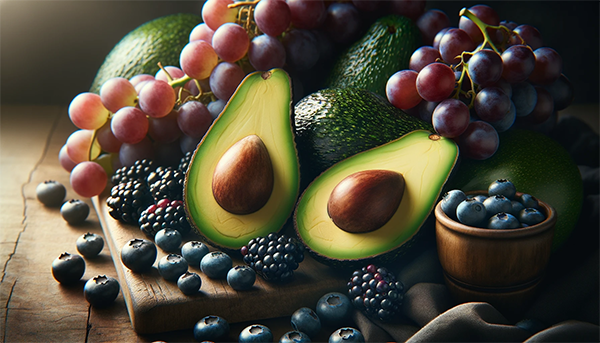
Key Foods: avocados, blueberries, blackberries and dark grapes
Benefits: These berries are known to improve blood circulation, reduce LDL cholesterol, and prevent arterial plaque buildup. Notably, a study found women who consumed these foods had a 32% reduced risk of heart attacks.
Heart disease remains one of the top causes of death worldwide. It’s crucial to adopt dietary habits that fortify heart health. Dark-skinned fruits and vegetables are rich in flavonoids. Berries and avocados have been shown to improve heart function and reduce blood pressure. By consuming these whole foods, you’re not just indulging in a fresh treat but actively contributing to your heart’s longevity.
Nature’s Anti-inflammatory Agents
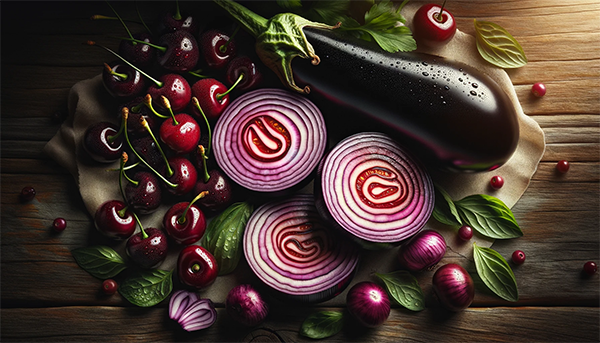
Key Foods: dark cherries, eggplants, red onions
Benefits: These foods are rich in compounds that have anti-inflammatory properties, offering relief from conditions like arthritis and asthma.
Chronic inflammation can lead to numerous health issues, from joint pain to respiratory problems. Incorporating anti-inflammatory foods into one’s diet can mitigate these effects. For instance, dark cherries contain anthocyanins that can reduce inflammation and may even provide pain relief comparable to some over-the-counter pain medications.
Boosting Brain Power

Key Foods: dark chocolate, black coffee and walnuts
Benefits: Regular moderate consumption of these foods has been linked to improved cognitive functions, with studies indicating slower cognitive decline rates.
Cognitive decline can be a natural part of aging, but dietary choices can influence its pace. Berries, particularly blueberries, have been linked to increased neural signaling in brain centers. This not only enhances memory and cognition but could also delay the onset of illnesses like Alzheimer’s.
Sunscreen from the Inside Out
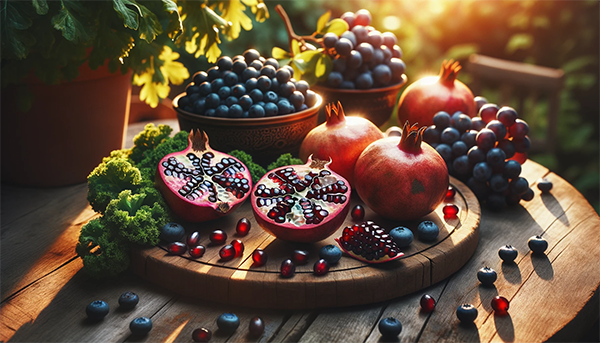
Key Foods: pomegranates, dark grapes , blueberries and dark leafy greens
Benefits: These fruits contain compounds that offer protection against UV rays, potentially reducing the risk of sunburns and skin cancers.
While external sunscreens are vital for skin protection, certain foods can boost the skin’s innate defense against harmful UV rays. Consuming pomegranates, for instance, can increase the skin’s resistance to sun damage by acting as an internal sunblock.
For a Healthy Gut
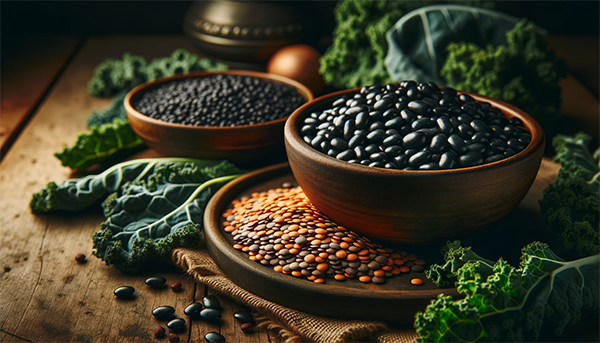
Key Foods: black beans, lentils, dark leafy greens
Benefits: These foods promote a healthy gut microbiome due to their fiber content. Fiber acts as a prebiotic, fostering beneficial bacteria and aiding digestion.
Gut health is paramount for overall well-being. A balanced gut microbiome aids in digestion, nutrient absorption, and even mental health. High-fiber foods, like leafy greens and black beans, encourage the growth of beneficial gut bacteria, ensuring a harmonious gut environment.
Vision Protectors

Key Foods: dark grapes, blueberries, blackcurrants and dark leafy greens
Benefits: These berries contain compounds that protect eyes from blue light and oxidative stress, potentially reducing age-related macular degeneration risks.
With increased screen time in our digital age, eye health is more pertinent than ever. Foods rich in lutein and zeaxanthin, such as dark grapes and blackcurrants, can filter harmful blue light, reducing digital eye strain and promoting long-term visual health.
Bone Health and Beyond
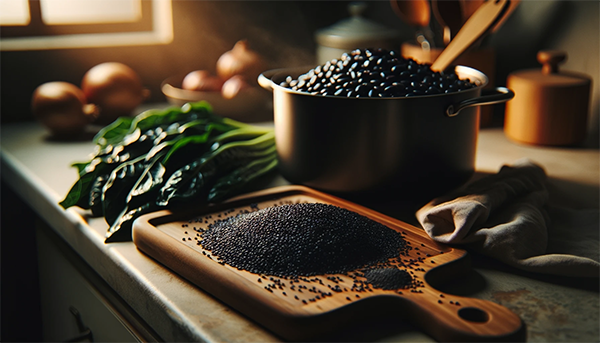
Key Foods: black beans, black sesame seeds and dark leafy greens
Benefits: These seeds are calcium-rich, essential for strong bones, and also contain magnesium, aiding in calcium absorption.
As we age, bone density can decrease, leading to conditions like osteoporosis. Incorporating calcium-rich foods, especially those that also contain magnesium, can ensure optimal bone health. Black sesame seeds are a prime example, providing both these vital minerals as well as sesamin in abundance.
Weight Management Champions
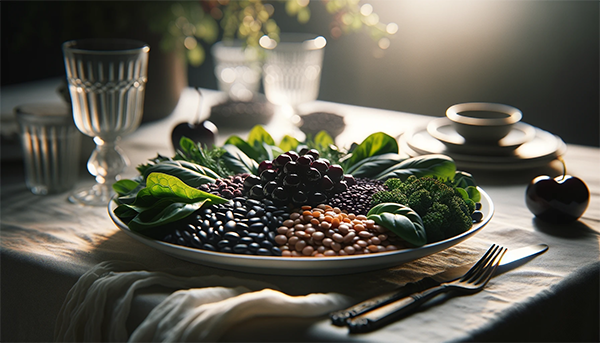
Key Foods: black beans, lentils, dark cherries and dark leafy vegetables
Benefits: These foods ensure prolonged satiety due to their high fiber content, making them excellent for weight management.
Managing weight effectively requires foods that make one feel full, reducing the tendency to overeat. Foods like black beans and lentils are not only nutrient-dense but also high in fiber, ensuring prolonged feelings of fullness and aiding in weight management.
Immune System Boosters
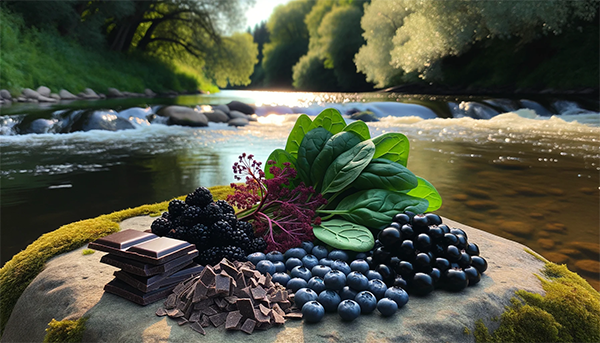
Key Foods: elderberries, blueberries, dark chocolate, and spinach
Benefits: Rich in vitamin C and other immune-boosting compounds, they help strengthen the body’s defenses, especially during flu season.
A robust immune system is the body’s primary defense against pathogens. Elderberries, packed with vitamin C, antioxidants, and anti-inflammatory compounds, can give the immune system a significant boost, potentially reducing the duration and severity of illnesses like colds and flu.
A Comprehensive List of Dark-skinned Foods
There is plenty of overlap between various dark-skinned foods and their health benefits. Nonetheless, here is a comprehensive list of the healthiest dark-hued foods and their primary benefits to incorporate into your regular diet:
- berries:
- blueberries: rich in antioxidants, supports brain health, and may improve memory
- blackberries: high in fiber, vitamins C and K, and may boost oral health
- dark grapes: contains resveratrol, which may protect against heart disease and certain cancers
- elderberries: immune-boosting properties, and may alleviate flu symptoms
- blackcurrants: high in vitamin C and may improve eye health
- fruits (excluding berries):
- avocados: rich in healthy fats, supports heart health, and contains fiber which aids in digestion
- black plums: supports bone health and regulates blood sugar levels
- figs: rich in fiber and essential minerals, aids in digestion
- pomegranates: anti-inflammatory properties and may lower blood pressure
- açaí berries: rich in antioxidants and may reduce bad cholesterol
- black cherries: contains melatonin, which can improve sleep quality.
- vegetables:
- eggplants (aubergines): contains nasunin, an antioxidant that may protect brain cells
- purple carrots: contains anthocyanins which have anti-inflammatory properties
- purple bell peppers: high in antioxidants and vitamins, supports immune function
- purple kale: detoxifying benefits and rich in vitamins A, C, and K
- purple Brussels sprouts: contains cancer-fighting compounds
- black tomatoes (like kumato): rich in lycopene which may support heart health
- grains and legumes:
- black rice: contains anthocyanins which may reduce the risk of heart disease
- black quinoa: high in protein and essential amino acids
- black beans: supports heart health and is a good source of protein and fiber
- lentils (especially beluga lentils): high in protein and supports digestive health
- black chickpeas (kala chana): rich in vitamins, minerals, and may support bone health
- seeds and nuts:
- black sesame seeds: supports bone health and may lower blood pressure
- black chia seeds: high in omega-3 fatty acids and supports digestive health
- others:
- dark chocolate (with high cocoa content): rich in antioxidants and may improve heart health
- black coffee: contains antioxidants and may boost metabolism
- black olives: contains healthy fats and may reduce inflammation
Each of these foods offers a unique set of nutrients and health benefits. It’s worth exploring their individual nutritional profiles and incorporating them into a balanced diet for maximum health benefits.
Dark-skinned foods are not just a feast for the eyes but also a boon for health. By incorporating them into our diets, we’re taking proactive steps toward improved health, longevity, and well-being. The colors on our plates often reflect the benefits we reap, and in the case of these dark-skinned foods, the benefits are profound and plentiful.









